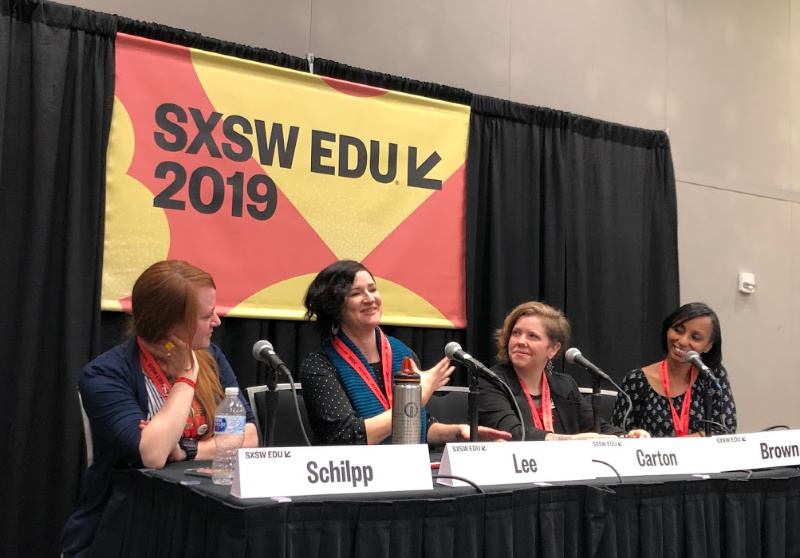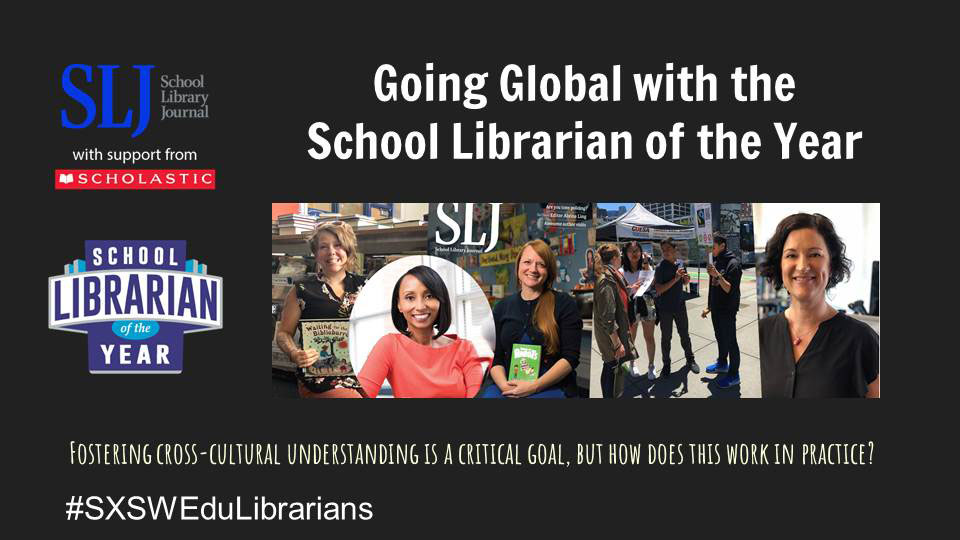Librarians ‘Go Global’ at SXSW EDU 2019
Librarians represented at SXSW EDU, as SLJ's School Librarian of the Year honorees, Ali Schilpp, Cassy Lee, and Michelle Carton, presented the session "Going Global with the School Librarian of the Year" in Austin.

Librarians, like most educators, want to bring the world to their students. That “starts with cultural understanding,” said Tamiko Brown, school librarian at Ed White Elementary School in Houston, TX, as she kicked off the panel “Going Global with the School Librarian of the Year” at SXSW EDU in Austin last week.
School Library Journal’s (SLJ) 2017 School Librarian of the Year, Brown moderated the March 5 program, which featured the 2018 School Librarian of the Year honorees: Ali Schilpp, Cassy Lee, and Michelle Carton.
‘Going global’ in everyday practice
Global citizenship is at the heart of Carton’s work. That’s evident throughout her resource-rich site “Global Education Alaska,” filled with related project ideas and curricular tie-ins, and among the tools shared during the SXSW EDU session, a program organized by School Library Journal, with support from Scholastic.
SLJ’s 2018 Champion of Civic Engagement, Carton is the librarian at Tudor Elementary School, in Anchorage, AK. Her hallmark project: a “Young Global Citizens” curriculum, which Carton created after she was unable to find related materials that were accessible to her elementary students.
Her basic tenets of global citizenship for kids are modeled after the Four Domains of Global Competence, created by the Asia Society. They are: Learn about the world; Understand the variety of perspectives; Connect with the world; and Take action—think global, act local. These principles align with the AASL Standards, notes Carton.
Beyond promoting empathy and understanding among her students, Carton cites a practical benefit of global teaching. “If we look at education with a different perspective,” she says, “We don’t have to take time in silos to do Social Emotional Learning,” as these concepts are integral to her curriculum.
Carton acknowledges that teachers are tight on time and budget, placing the onus on her to provide the programming and gather resources. “I feel my role is a librarian is to foster those opportunities,” she explains.
For example, Carton creates a calendar for teachers, noting commemorative dates. So in November, for example, there’s Día de los Muertos, the fastest growing international holiday, according to the school librarian. It’s also Celebrate Native Cultures Month and Veteran’s Day, with Carton’s adjacent notation: “think local.”
Check ‘em out: human books
Fostering empathy gets highly personal at the Chinese American International School (CAIS) in San Francisco, where Lee, the middle school learning center coordinator, has spearheaded a powerful project.
She engaged the Human Library, a Denmark-based project that lets you check out people, “human books.” The idea is to foster conversations about prejudice based on a person’s identity. Choose someone by their title, “refugee,” for example. And then talk about what it’s like to be them.
“How often do we get to do that?’ says Lee, SLJ's 2018 Champion of Student Voice.
Seizing the learning opportunity, Lee applied to the Human Library to bring living checkouts to CAIS. Her principal, who wasn’t immediately clear on what the whole thing was initially, approved Lee’s proposal to make the project a whole-school event.
Their selections? A Korean American musician. A gay cop. A gender-nonconforming woman who performs as “Elvis Herselvis.” The “nerdy white guy,” as Lee described him, is a former heroin addict who has experienced homelessness.
“We talk a lot about identity at our school,” says Lee, who says the project has started conversations in her school across cultures. The students spent a total of 40 minutes with each “human book,” in conversation. Lee was careful to steer clear of tokenism.
Doing this with middle schoolers? It was scary, she admits. But, she says, “It was powerful,” as evidenced in the kids’ words. After meeting and speaking with a biracial Chinese and African-American woman, one student commented “I understand a person’s ethnicity can be different from how they look.”
Expanding horizons
Shifting perspective comes naturally to Schilpp. The 2018 School Librarian of the Year moved from urban Baltimore to the tiny town of Accident, MD, where she became the first-ever librarian at Northern Middle School. In her five years there, Schilpp has broadened her view as well as the perspectives of her students.
Reaching out and engaging with other educators through Twitter, she was able to make reading and books a truly global experience. A former colleague now living in Hawaii connected Schilpp, through her work at a public library, to Kwame Alexander, and so on and so forth; the ensuing connections themselves demonstrating the beauty of extending oneself.
Being the first and only librarian at Northern Middle, Schilpp was free to invent her own program. At the same time, she didn’t want to swoop in and simply lay down rules for digital citizenship, a concept that the kids had never encountered before. “I thought if I connected the students globally, it would be embedded and an authentic way for them to connect with people,” says Schilpp.
“We want to provide mirrors and windows? I also need to provide doors. This is Appalachia,” she adds, noting the limitations facing her kids around experience and employment opportunities. “I want them to see what’s out there. I want them to connect to diverse people. So if they go to college, they know how to connect.”
Schilpp launched a LEGO Travel Buddy project that journeyed from Accident to Thailand, then London, Maine, Hawaii, Peru—”They’re all over the world,” she says.
Schilpp sent a Travel Buddy to Lee, which culminated in a teleconference between the two schools. The kids were tickled from the start, says Schilpp, as “[Lee’s students] greeted them in Chinese.”
The full slide set from the session is available here.

Other librarian sessions at SXSW EDU 2019
Libraries Are Being Starved—Whose Fault Is It?
Reinvention: Designing Future Ready Libraries
Going Digital: The Future of the K-12 Library

RELATED
The job outlook in 2030: Librarians will be in demand
The job outlook in 2030: Librarians will be in demand
ALREADY A SUBSCRIBER? LOG IN
We are currently offering this content for free. Sign up now to activate your personal profile, where you can save articles for future viewing








Add Comment :-
Be the first reader to comment.
Comment Policy:
Comment should not be empty !!!